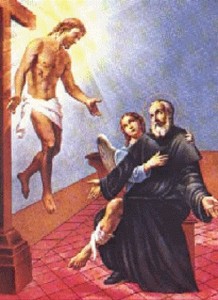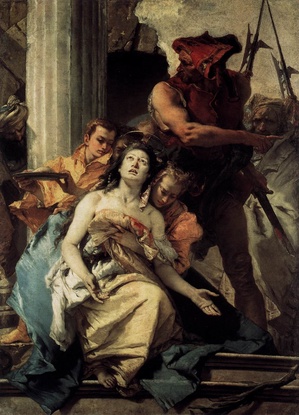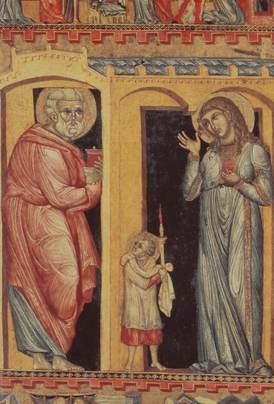 On this feast of Saint Peregrine, the Church prays:
On this feast of Saint Peregrine, the Church prays:
Eternal Father, I wish to honor St. Peregrine, and I give Thee thanks for all the graces Thou hast bestowed upon him. I ask Thee to please increase grace in my soul through the merits of this saint, and I commit the end of my life to him by this special prayer, so that by virtue of Thy goodness and promise, St. Peregrine might be my advocate and provide whatever is needed at that hour. Amen
A biography of the Saint that asks God to cure cancer:
Today, May 16, we celebrate the feast of Saint Peregrine Laziosi (1260-1345), priest, and patron saint of those suffering with cancer, AIDS, and other serious diseases. Saint Peregrine was miraculously cured during his lifetime of cancer, through his devotion to the suffering Jesus on the Cross. Saint Peregrine is a reminder of the gracious love and healing of a personal relationship with Jesus. He is invoked today to intercede in the healing and comfort of those struggling against disease.
Peregrine Laziosi was born into a wealthy family at Forli, Italy. He spent a worldly youth active in politics, and was originally a member of the anti-papal party —a strongly anti-Catholic movement in Italy. During one uprising, Peregrine struck Saint Philip Benizi, who had been dispatched by the Pope to bring peace, in the face. When Philip offered the other cheek to his young attacker, Peregrine was so overcome that he repented and converted immediately to Catholicism.
Shortly thereafter, Peregrine received a miraculous vision from Our Blessed Mother, in which she instructed him to journey to Siena, Italy, and join the Servite Order there. He left his wealth and status and did as Mary instructed, joining the Servites. Once a Servite, Peregrine imposed strict penances on himself as reparation for his earlier actions, including the observation of strict silence and solitude, and refusal to sit down. It is believed that Peregrine stood for approximately 30 years, which eventually led to illness.
After his training and ordination, he was assigned to his hometown, Forli, and there founded a new house of the Servite Order. He was a gifted preacher, and brought many to the faith. He was similarly a patient, gentle, and respected confessor, and many traveled a great distance to meet with him in the confessional. When not interacting with others or preaching, he maintained his vow of silence.
Saint Peregrine eventually developed difficulty with his circulation, likely due to his constant standing, which led to cancer of the foot. This aggressive cancer began spreading up his leg, and with no cure possible, his doctors scheduled an amputation of the limb. Saint Peregrine spent the night before his surgery in fervent prayer before the crucified Christ. As he drifted off to sleep while praying, he experienced a vision of Jesus, coming off the Cross, and touching the afflicted area. The next morning, when he awoke, his cancer had been completed cured. Saint Peregrine went on to live another 20 years, serving the Lord and his community.
Peregrine died at the age of 85, and was canonized by Pope Benedict XIII. He reminds us of the miraculous grace of conversion and healing that is possible through Our Lord. An adamant opponent to the Church, Saint Peregrine became a powerful preacher, leading many to the faith. He turned to the Lord, and was richly rewarded. How might we experience conversion today?
Saint Peregrine, thou hast given us an example to follow; as a Christian thou wert steadfast in love; as a Servite thou wert faithful in service; as a penitent thou humbly acknowledgedst thy sin; afflicted thou borest suffering with patience. Intercede for us, then, with our Heavenly Father so that we steadfast, humble and patient may receive from Christ Jesus the grace we ask.





